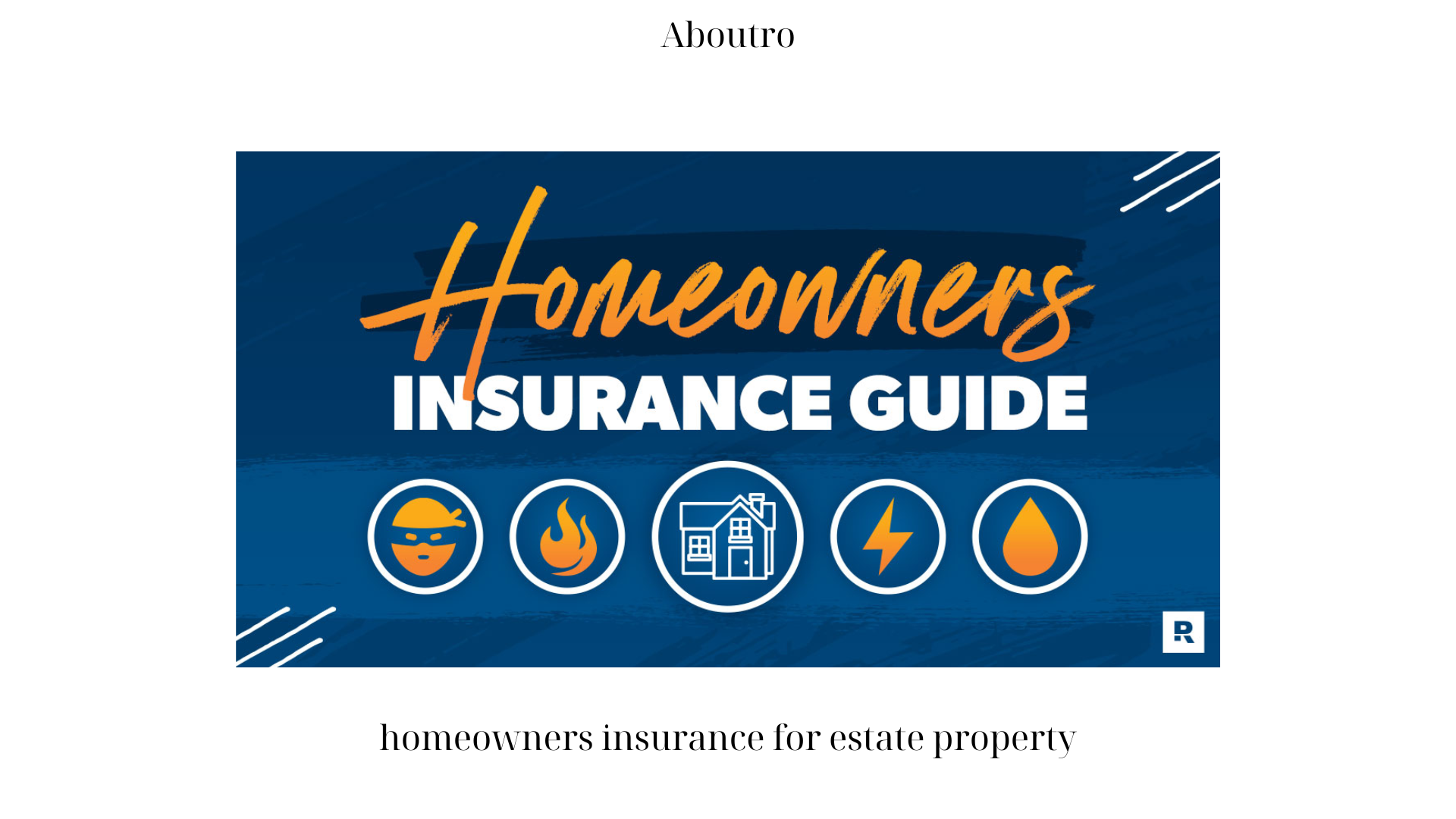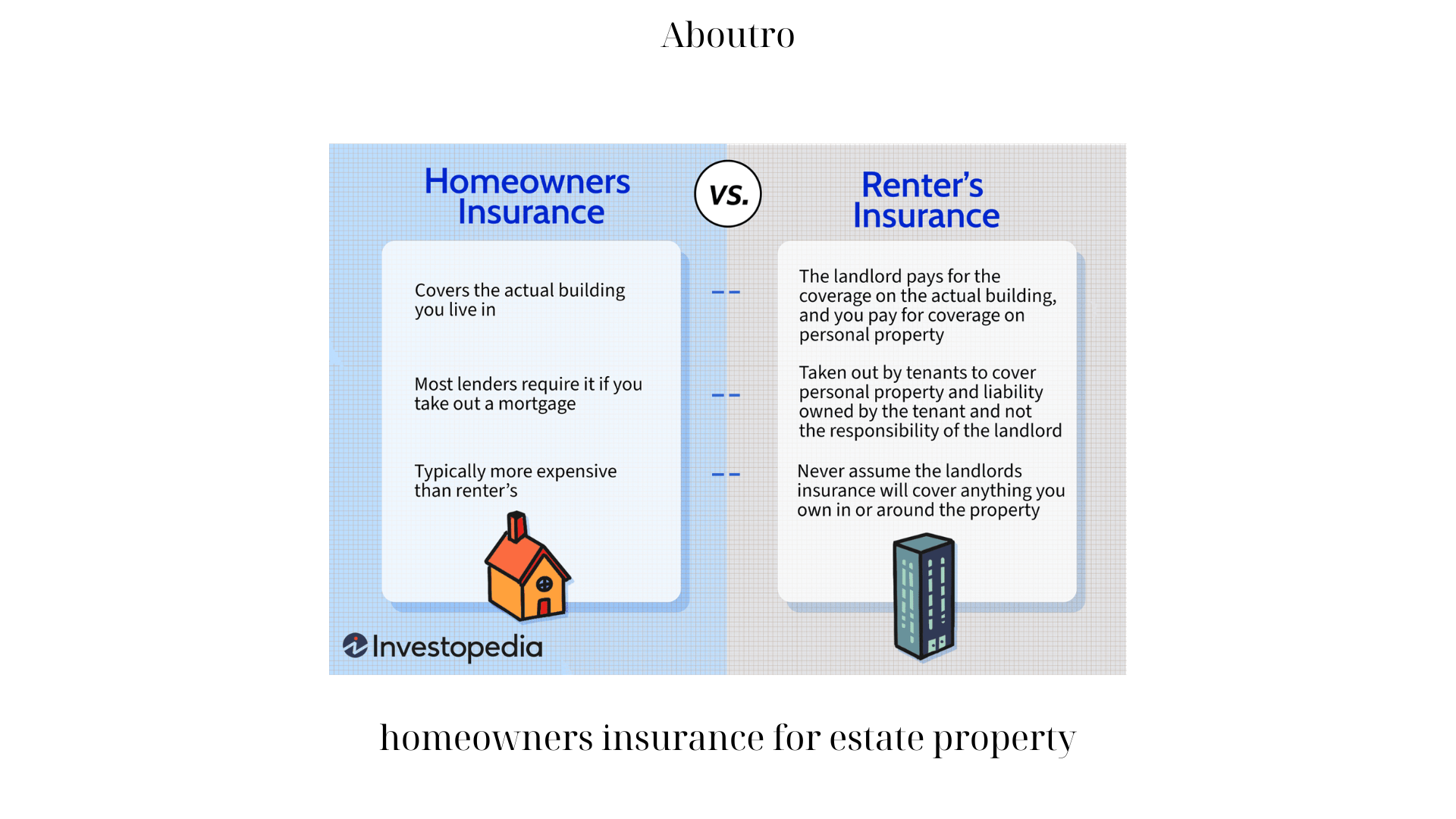Homeowners Insurance for Estate Property: A Comprehensive Guide
Owning an estate property comes with a unique set of responsibilities and considerations. One crucial aspect of estate ownership is having the right homeowners insurance coverage in place. Homeowners insurance provides protection for your property and possessions against various risks, such as fire, theft, and natural disasters. However, estate properties often have different characteristics and requirements compared to traditional homes, necessitating a specialized approach to insurance. In this comprehensive guide, Aboutro will explore the importance of homeowners insurance for estate property and provide valuable insights into coverage options, considerations, and tips for obtaining adequate protection.
Homeowners Insurance for Estate Property: A Comprehensive Guide

Understanding the Unique Needs of Estate Property Insurance
Estate properties are typically characterized by their larger size, extensive grounds, and unique features such as outbuildings, swimming pools, and recreational facilities. These unique elements require specialized insurance coverage to adequately protect the property and its assets. Standard homeowners insurance for estate property policies may not provide sufficient coverage for estate properties due to their higher property value and unique risks associated with their size and features.
Coverage Options for Estate Property Insurance
When it comes to insuring your homeowners insurance for estate property property, several coverage options are available to ensure comprehensive protection. Let’s explore some of the key coverage options to consider:
- Dwelling Coverage: This homeowners insurance for estate property protection for the main dwelling structure on your estate property. It includes coverage for damage caused by perils such as fire, windstorms, and vandalism.
- Other Structures Coverage: Estate properties often have additional structures, such as guesthouses, barns, or garages. Other Structures Coverage extends protection to these separate structures on your property.
- Personal Property Coverage: This coverage protects your personal belongings, including furniture, appliances, clothing, and valuable items like jewelry or artwork. It provides reimbursement for losses caused by covered perils, such as theft or damage.
- Liability Coverage: Liability coverage is essential for estate property owners. It offers homeowners insurance for estate property protection if someone is injured on your property and you are held responsible for their medical expenses or legal fees. It also covers legal defense costs in case of a lawsuit.
- Umbrella Insurance: Estate property owners may want to consider umbrella insurance, which provides an homeowners insurance for estate property layer of liability coverage beyond the limits of their primary homeowners policy. Umbrella insurance is especially valuable for estate owners due to the increased risk exposure associated with their property’s size and amenities.
- Additional Living Expenses: If your homeowners insurance for estate property becomes uninhabitable due to a covered loss, additional living expenses coverage can help cover the costs of temporary accommodation, meals, and other necessary expenses while your property is being repaired or rebuilt.

Considerations for Estate Property Insurance
When seeking homeowners insurance for your estate property, keep the following considerations in mind:
- Property Valuation: Accurately homeowners insurance for estate property the value of your estate property is crucial to ensure you have adequate coverage. Consider working with a professional appraiser who specializes in valuing high-value properties to determine the replacement cost of your estate.
- Specialized Features: Estate homeowners insurance for estate property often boast unique features like extensive landscaping, swimming pools, or tennis courts. Make sure your insurance policy adequately covers these features and any associated risks.
- High-Value Items: If your estate property includes high-value items such as antiques, collectibles, or fine art, consider obtaining additional coverage or a separate policy specifically tailored to cover these valuable assets.
- Risk Assessment: Conduct a thorough risk assessment of your estate property to identify potential hazards or vulnerabilities. This assessment can help you determine the appropriate coverage limits and take steps to mitigate risks.
- Insurance Riders: Depending on your estate homeowners insurance for estate property specific needs, you may require additional coverage riders or endorsements. These can include coverage for flood damage, earthquake damage, or coverage for specific events or activities taking place on your property.

Tips for Obtaining Adequate Coverage
To ensure you obtain adequate homeowners insurance for estate property for your estate property, consider the following tips:
- Work with an Experienced Insurance Agent: Seek out an homeowners insurance for estate property agent who specializes in high-value properties and has experience insuring estate properties. They can provide expert guidance and help tailor a policy to meet your unique needs.
- Review and Understand Policy Exclusions: Carefully review your policy documents to understand any exclusions or limitations that may affect coverage for your estate property. Discuss these with your insurance agent and explore options to mitigate any gaps in coverage.
- Document Property Improvements: Keep detailed records of any renovations, additions, or improvements made to your estate property. This documentation will help ensure proper valuation and coverage for these enhancements.
- Regularly Review and Update Coverage: As your estate property evolves or if you make significant changes to its features or amenities, revisit your insurance coverage to ensure it adequately reflects the current state and value of your property.
- Consider Multiple Quotes: Obtain quotes from multiple insurance providers to ensure you are getting competitive rates and comprehensive coverage. Compare the terms, coverage limits, and premiums offered by different insurers to make an informed decision.
Conclusion
Securing the right homeowners insurance for your estate property is vital to protect your investment and provide peace of mind. Giventhe unique characteristics and higher value associated with estate properties, it’s crucial to have specialized coverage options in place. By understanding the unique needs of estate property insurance, exploring coverage options, considering specific factors, and following the tips provided, estate property owners can obtain comprehensive homeowners insurance that adequately protects their property, assets, and liabilities. Remember, working with an experienced homeowners insurance for estate property and homeowners insurance for estate property reviewing and updating coverage ensures that your estate property remains adequately protected over time. Safeguarding your estate property with the right homeowners insurance allows you to enjoy the benefits of ownership while mitigating potential risks and uncertainties.